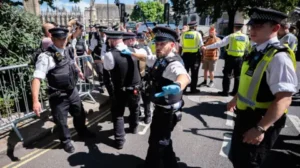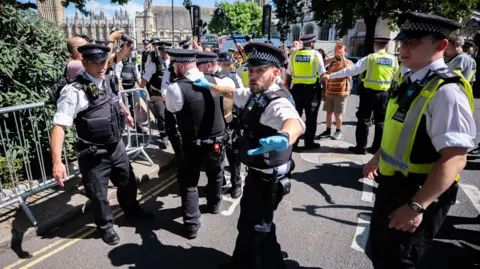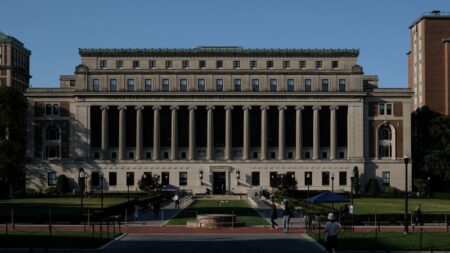In recent protests that erupted across the United Kingdom in response to the government’s decision to designate Palestine Action as a proscribed terrorist organization, a total of seventy-one arrests were recorded. The protests unfolded in major cities such as London, Cardiff, and Manchester, where demonstrators voiced their opposition to the newly imposed restrictions. According to statements from law enforcement officials, these arrests were largely made on suspicions of terrorism-related offenses.
The designation of Palestine Action as a terrorist group under the Terrorism Act of 2000 took effect on the previous Saturday, marking a significant escalation in government measures aimed at curtailing the activities of this activist organization. Membership or active support for Palestine Action now carries legal ramifications, which has prompted a strong backlash among supporters advocating for Palestinian rights. Amid these restrictions, the Metropolitan Police reported that forty-one protesters were arrested in London alone, many for allegedly supporting a proscribed organization. The escalating tensions resulted in various instances of public disorder, including a singular arrest for common assault.
The events began to gain momentum on a Saturday afternoon at approximately 1:00 PM BST, when two distinct groups of protesters gathered in Parliament Square, waving placards inscribed with messages like “I oppose genocide, I support Palestine Action.” During the protests, demonstrators often lay on the ground intertwined with each other while police conducted bag searches, leading to a tense standoff. Footage captured by bystanders showed police escorting activists away and detaining them in vans—one protester was notably removed from the statue of Nelson Mandela shortly after 2:30 PM BST.
Law enforcement, particularly the Metropolitan Police, indicated their intention to take vigorous action against individuals engaging in activities that constitute support for the proscribed group, which could entail chanting, displaying flags, or wearing associated clothing. South Wales Police also detained thirteen demonstrators who rallied outside the BBC offices in Cardiff, emphasizing their commitment to uphold lawful expressions of dissent. Greater Manchester Police confirmed that sixteen arrests were made in St Peter’s Square, responding to a protest organized by the group Defend Our Juries.
Despite criticism, the government has justified the decision to classify Palestine Action as a terrorist organization by citing elements of the group’s historical actions—such as targeting arms companies since the onset of the current conflict in Gaza. The radicalization of their protests was highlighted by an incident in June where activists vandalized two Voyager aircraft at RAF Brize Norton, for which Palestine Action claimed responsibility. Following this, charges related to conspiracy to commit criminal damage were placed against four individuals, while others were released without charge or on bail after being arrested in connection to ongoing investigations.
The controversies surrounding these protests come in the wake of significant military escalations in the Gaza Strip, following a violent attack on October 7, 2023, attributed to Hamas. This assault resulted in high casualties, prompting Israel to launch extensive military operations in response. The humanitarian toll in Gaza has been staggering, with claims by the Hamas-run health ministry indicating over 57,800 fatalities since the initiation of the conflict.
In political corridors, there have been heated discussions concerning the legal ramifications of labeling Palestine Action a terror group. Home Secretary Yvette Cooper pointed to a “long history” of criminal damage associated with the group as justification for its proscription, asserting that the United Kingdom’s defense structure must remain paramount. Critics, including legal representatives for members of Palestine Action, argue that the government’s actions reflect authoritarian tendencies with the potential to suppress legitimate protest. Legal challenges to revoke the proscription have faced setbacks, underscoring the contentious nature of this escalating legal and political battle over the right to protest, particularly regarding the sensitive issue of Palestinian rights and activism within the UK.










